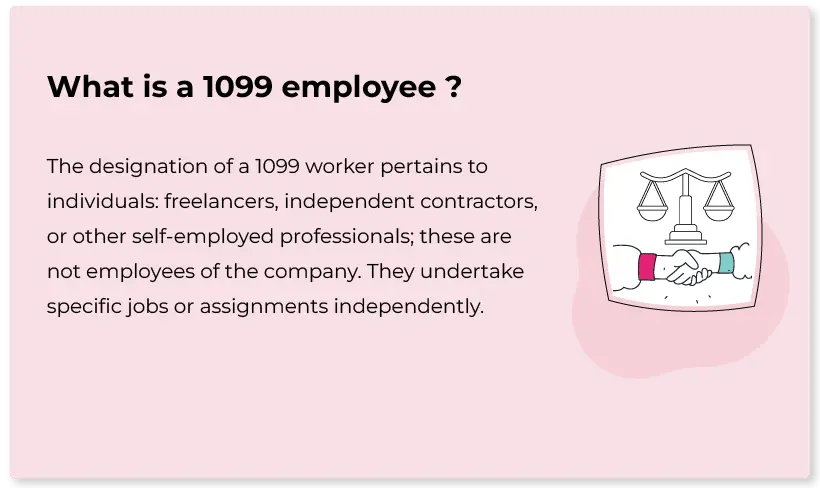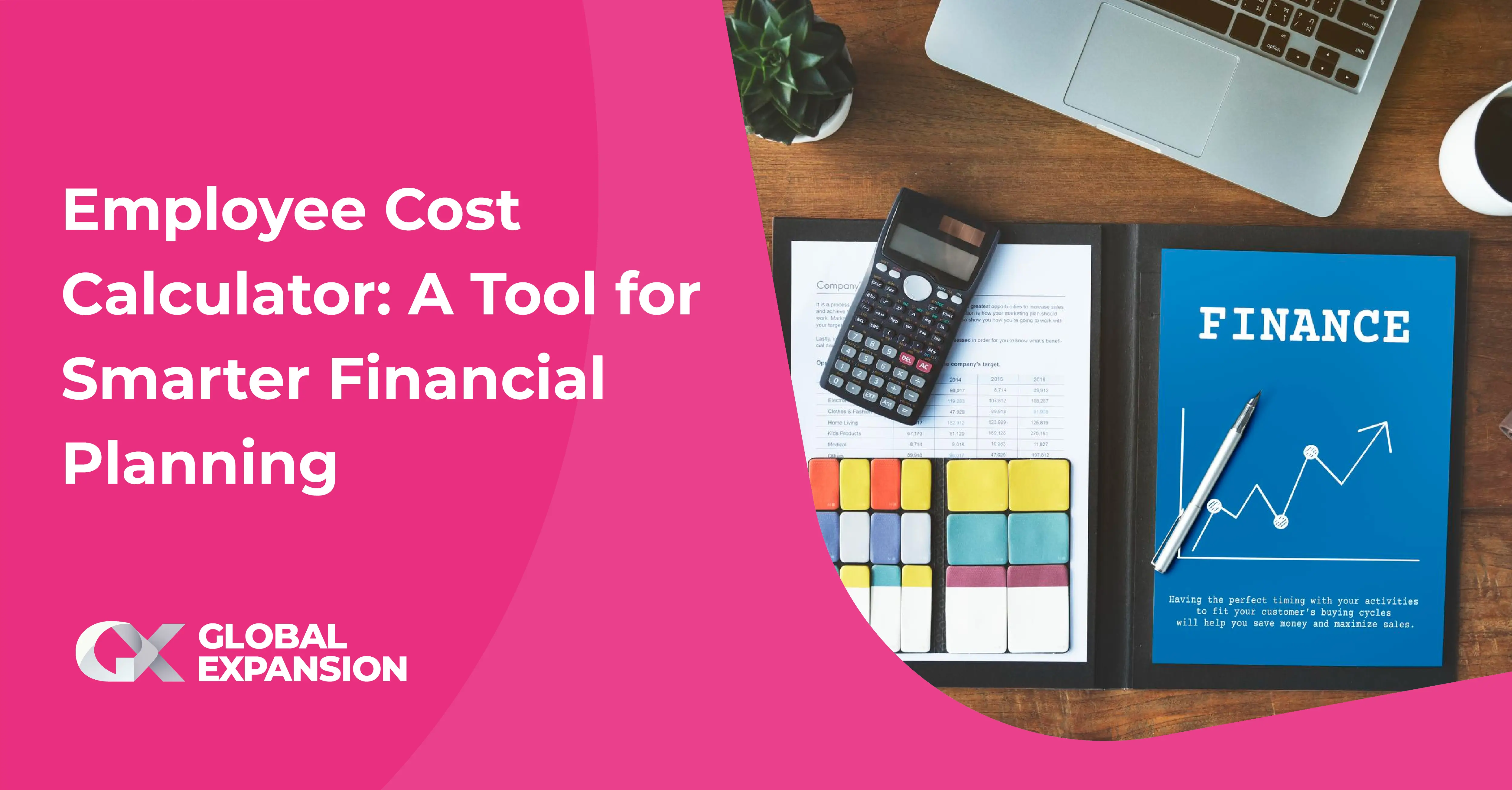What is a 1099 Employee? A Comprehensive Employer Guide

Have you ever hired 1099 workers?
Do you know - what is a 1099 employee?
What are the rules and requirements for independent contractors, pay issues, and other stuff?
Not merely a checkbox on business owners' list, understanding the definition of what is a 1099 employee is crucial for remaining compliant with wage and tax laws. Moreover, comprehension regarding distinctions between a 1099 employee versus a W-2 counterpart empowers strategic planning to meet your business's labor requirements effectively.
What is a 1099 Employee?

The designation of a 1099 worker pertains to individuals: freelancers, independent contractors, or other self-employed professionals; these are not employees of the company. They undertake specific jobs or assignments independently.
You do not pay them with wages or a salary, as they are not classified as employees. Instead, you compensate the 1099 worker based on your mutually agreed terms. Moreover, concerns about income tax withholding, Social Security and Medicare taxes' deductions and payments, or unemployment taxes fall outside of your responsibilities.
If you want to know what a work permit is, read our blog.
Another difference emerges with tax: instead of issuing a W-2 for traditional employees to report their pay, you provide independent contractors - whom you compensated with an amount exceeding $600 for the year - a 1099-NEC. These independent contractors then bear responsibility for paying self-employment taxes themselves. Ensure the contractor completes Form W-9 upon engagement to guarantee you possess accurate filing information.
What is a 1099 Employee?
An individual, recognized as a 1099 employee or an independent contractor, actively engages with a company to execute specific services. Full-time or part-time staff typically represents W-2 employees in contrast; however, employers usually hire 1099 workers for distinct projects or durations--emphasizing the delivery of defined outcomes over integration into their workforce.
Critical Characteristics of 1099 Employees
Independence:
Independent contractors exert a higher degree of control over their work methods; they do not face equivalent levels of supervision and direction as W-2 employees.
Tax Status:
1099 employees bear the responsibility of managing their taxes; this includes remitting both employer and employee portions for Social Security and Medicare, in addition to income taxes. Notably, employers abstain from withholding these specific tax components from their paychecks.
Contractual Arrangement:
Typically, a contract governs the engagement between an employer and a 1099 employee; this agreement delineates--with precision--the scope of work. It further stipulates payment terms, along with other pertinent details that establish clear expectations on both sides.
Implications for Employers:
It is essential to know that employers bear the crucial responsibility of precisely classifying workers into two categories: W-2 employees or 1099 employees; misclassification if identified, can trigger legal and financial repercussions. To guarantee compliance--a paramount objective in this context--it is imperative to grasp and adhere steadfastly to the criteria set forth by the Internal Revenue Service (IRS).
Unlike W-2 employees, employers do not have to withhold taxes; they are also exempt from providing benefits or contributing to Social Security and Medicare for 1099 workers: this underscores the distinction in their contractual obligations. Yet —a crucial pivot point— it remains incumbent upon them that contractors receive full payment as stipulated within agreed contracts.
Both parties require an essential, well-drafted contract for contractual clarity. They must clearly define the scope of work, specify payment terms and deadlines, and include any other pertinent details to circumvent misunderstandings as well as disputes.
Risk Management:
The flexibility that 1099 employees provide is undeniable; however, it's crucial to note--and employers must not overlook this point--that they also present specific risks. Therefore, conducting a meticulous assessment becomes necessary for employers: the nature of the work and degree of control exerted should align perfectly with independent contractor classification.
How do you Classify a Worker as a 1099 Employee?
Classifying a worker as a 1099 employee is not a binary process; numerous nuances come into play. Each individual must undergo classification, a task that demands meticulous detail—to determine the appropriate categorization.
The status of a worker as a 1099 employee significantly influences the extent to which an employer exercises control over them. The IRS posits that if an employer merely dictates the result of work without specifying its nature or method of execution, then it is highly probable for this worker to qualify as an independent contractor.
The IRS relies on These Common Law Rules:
Does the business exert control over the worker's actions and methods in performing their job?
Financial:
Does the client exercise control over the business aspects of a worker's job? These business factors encompass payment methods for workers, tool provision responsibility - whether it rests with the worker or employer - and determination on expense reimbursement.
Relationship Type:
Does a written contract exist between the worker and the paying business? Should we expect that the worker will receive benefits such as insurance, vacation pay, or a pension plan? Moreover, while knowing what a 1099 employee is, is it pivotal to note if tasks performed by the worker significantly contribute to crucial aspects of this business operation? Will the working relationship continue even after task completion?
Work Type:
The employer should carefully assess what a 1099 employee is and each worker individually; they must bear in mind that strategies effective in one situation may not yield the same results universally. Certain factors below could potentially indicate a worker's status as a W-2 employee rather than a 1099 employee:
- You provide the worker with training on a particular method of job performance.
- You provide tools and materials to complete tasks.
- You require the worker to follow a set schedule.
- You provide benefits such as medical insurance, vacation, pension plans, overtime pay, etc.
In most cases, an independent contractor or 1099 employee can:
- Refuse certain jobs.
- Completes tasks using their methods.
- Cater for their tool provision.
- Set and follow their schedule.
Unsure Whether to Classify a Worker as a 1099 Employee?
Should you complete the standard law rules test and remain uncertain, employers possess the option to file Form SS-8 with the IRS. We recognize this is a 1099 employee form as a determination of Worker Status for Federal Employment and Income Tax Withholding purposes.
The worker also holds the authority to submit their classification-determining form. Then, the IRS will review the facts you've presented; they shall determine a worker's status. Nevertheless, before furnishing you with a reply, it might take the IRS up to six months.
What are the Pros and Cons of Hiring a 1099 Worker?
Evaluate independent contractors as a potential staffing solution for your company; consider the advantages and disadvantages of this approach: here are several factors to ponder--a critical analysis that will guide you in making an informed decision.
Pros:
- There's less administrative work required of your HR team.
- Using contractors typically incurs lower costs, as you can avoid the need to provide them with benefits or concern yourself over worker's compensation.
- You have more flexibility to hire and terminate based on fluctuating needs.
Cons:
- They may not feel the same loyalty towards your company.
- It can be more challenging to integrate them into the culture.
- You have less control over their daily schedule or competing projects from other clients.
Global Expansion Can Support Your Global HR Team
We're not just an award-winning tech platform. Our expert support is included from onboarding to termination. You focus on your business, we take care of your people.
Talk to our expert HR team today about how we can access the world's best talent through our Employer of Record solutions.
Subscribe to our blog
Receive the latest GX blog posts and updates in your inbox.




